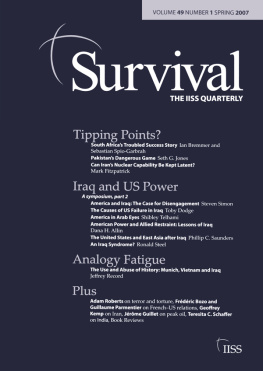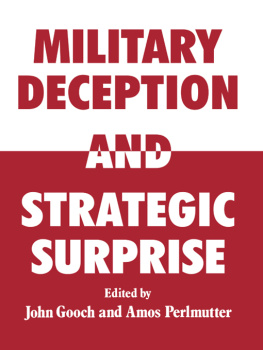Survival
The IISS Quarterly
The International Institute for Strategic Studies
Arundel House | 13-15 Arundel Street | Temple Place | London | WC2R 3DX | United Kingdom
Published 2007 by Routledge
2 Park Square, Milton Park, Abingdon, Oxon OX14 4RN
52 Vanderbilt Avenue, New York, NY 10017
The issue date is March 2007
Routledge is an imprint of the Taylor & Francis Group, an informa business
Copyright 2007 The International Institute for Strategic Studies
All rights reserved. No part of this book may be reprinted or reproduced or utilised in any form or by any electronic, mechanical, or other means, now known or hereafter invented, including photocopying and recording, or in any information storage or retrieval system, without permission in writing from the publishers.
Notice:
Product or corporate names may be trademarks or registered trademarks, and are used only for identification and explanation without intent to infringe.
ISBN 13:978-0-415-44026-4 (pbk)
South Africas Troubled Success Story
Ian Bremmer and Sebastian Spio-Garbrah
Growing public impatience with failed government strategies to improve the lives of South Africas black majority threatens the survival of the tripartite alliance that has governed the country since the end of apartheid. If the African National Congress-led government proves unwilling or unable to successfully address the issues - land reform and property rights - crucial for solving many other lingering economic ills, the ripple effects of capital flight and economic contraction will be felt throughout sub-Saharan Africa.
Pakistans Dangerous Game
Seth G Jones
The rising level of violence in Afghanistan has triggered widespread calls to increase NATOs presence. But there is growing evidence that a critical part of the solution lies not in Afghanistan, but across the Khyber Pass in Pakistan. Increasing the number of foreign troops or improving the competence of Afghan forces are no longer sufficient. Success requires a difficult political and diplomatic feat: convincing the government of Pakistan to undermine the insurgent sanctuary on its soil. It is time to fundamentally alter Americas and Europes approach toward Pakistan. Policymakers should focus on a much tougher policy that pressures Pakistan to curb public recruitment campaigns for the Taliban, close training camps and arrest key Taliban leaders in Pakistan.
Can Irans Nuclear Capability Be Kept Latent?
Mark Fitzpatrick
Iran may not yet have made a decision to produce nuclear weapons and the evidence trail of weapons plans and military involvement stops in 2003. If, as seems likely, UN sanctions and financial pressure do not persuade Tehran to stop its uranium enrichment programme, the United States may turn to military options to try to push back the date by which Iran could have a nuclear weapon. Low confidence that air strikes could delay Irans weapons programme, however, and the negative consequences that military action would entail should lead policymakers to consider whether the nuclear timeline might be prolonged through negotiation. Accepting the reality of small-scale, intermittent enrichment activity in exchange for tight international inspection access holds some appeal, and the asking price will only rise over time. But legitimising Irans programme has significant disadvantages, especially without an assurance of swift and severe penalties in the event the deal is broken.
America and Iraq: The Case for Disengagement
Steven Simon
The United States has already achieved all that it is going to achieve in Iraq; staying in the country can only drive up the price of these gains in blood, treasure and strategic position. Washington should therefore make clear now to the Iraqi government that, as the results of the anticipated surge become apparent, the two sides will be negotiating a US military disengagement from Iraq. This would entail withdrawing the bulk of American forces from Iraq within 1218 months; shifting the American focus to containment of the conflict and strengthening the US military position elsewhere in the region; and engaging Iraqs neighbours, including Iran and Syria, members of the UN Security Council and potential donors in an Iraq stabilisation plan. The civil war is unlikely to abate upon disengagement, but the lack of organisational capacity, broad communal consent, and heavy weapons on either side militates against a drastic increase in the casualty rate. The United States should act decisively and creatively across the wider Middle East to offset perceptions of American weakness triggered by the setback in Iraq. Full recovery from its misadventure in Iraq is likely to take the United States many years.
The Causes of US Failure in Iraq
Toby Dodge
None of the proposals for extracting the United States from the debacle in Iraq recognise the root causes of the violence and instability that has plagued the country since April 2003. The origins of the Iraqi civil war lie in the complete collapse of both the administrative and coercive capacity of the state. The Iraqi state, its ministries, their civil servants, police force and army ceased to exist in a meaningful way in the aftermath of regime change. It is the United States inability to reconstruct them that lies at the heart of the Iraq problem. Until the states capacity is substantially rebuilt - if ever - Iraq will continue to be violently unstable. Unless the United States can commit to the generation-long project of rebuilding the Iraqi state, Iraq will continue to be a place of misery for its population and instability for its region. This is a defeat of historic proportions for US foreign policy.
America in Arab Eyes
Shibley Telhami
The Iraq War has significantly altered the balance of power in the Gulf region and within the Arab world. It has also widened the gap between governments and publics in the region, increased the popularity of non-state actors, and resulted in an increase in terrorism and enhancement of al-Qaedas presence in the Arab world. But it has had little impact on the Palestinian-Israeli conflict, and has not made al-Qaedas agenda more popular. The rise of Islamic militant groups in the region appears to be more an effect of both the Iraq War and local circumstances, not a reflection of a sweeping Islamist globalist ideology. The imbalance of power in the Gulf will become more evident if and when American troops withdraw from Iraq, although the presence of US forces elsewhere in the Gulf will remain a major factor.
American Power and Allied Restraint: Lessons of Iraq
Dana H. Allin
Over the past six years, US moral prestige in Europe has collapsed. Following President George W. Bushs re-election, allied governments for reasons of state have tried to restore relations, but we can only speculate on whether such raison dtat constitutes sufficient basis for an ambitious alliance of democracies. On this difficult foundation, what should the United States expect or hope for from European allies to help restore its position? In theory at least, Europe offers three things. First, capacity: the Europeans are not over-endowed with military power, to be sure, but their troops are needed in Afghanistan, Lebanon and beyond. Second, legitimacy: if America cannot bolster the perceived legitimacy of its foreign policy by way of a common moral vocabulary with France, who seriously expects to find it with Russia, China or even India? Third, restraint: the embedding of American power in the imperfect order of global institutions and governance. This does not mean an abrogation of US sovereignty or autonomy - America is too powerful to sacrifice these in any meaningful sense. It does mean American leaders allowing themselves to be restrained by international opinion - a restraint that would have helped the United States avoid disaster in Iraq.





